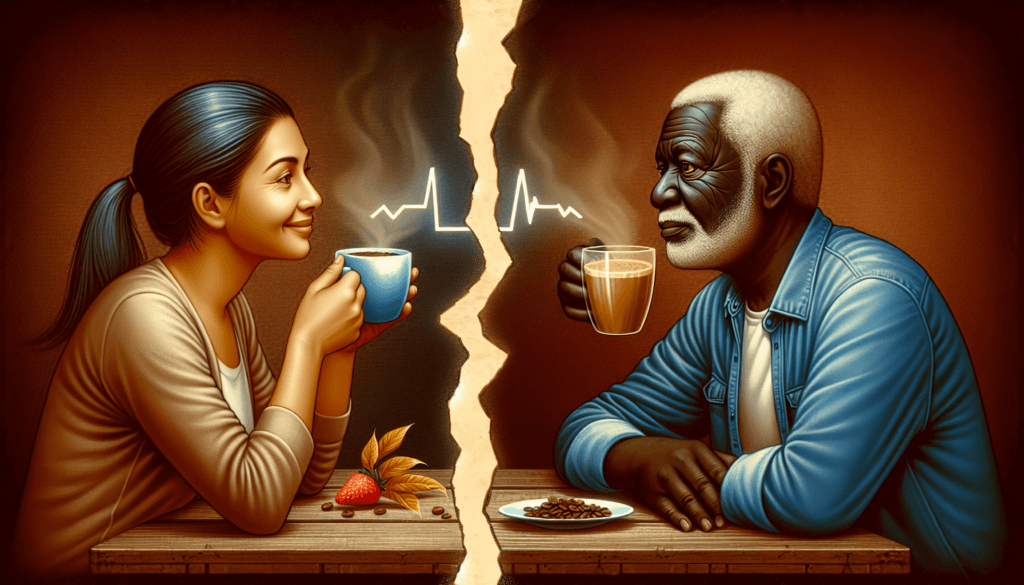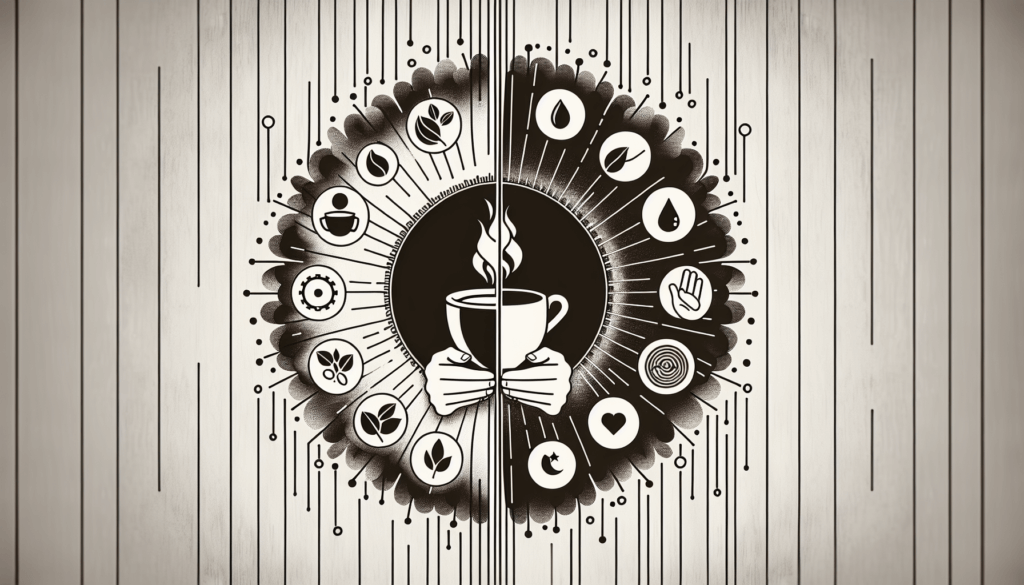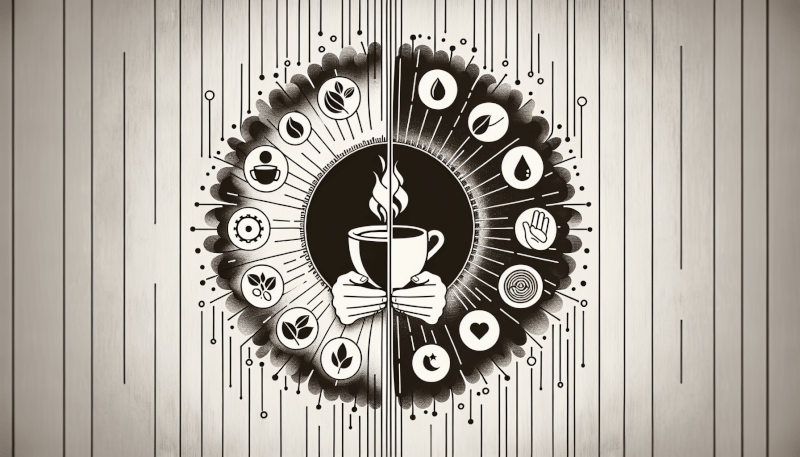Are you a non-coffee drinker? Does the absence of this popular morning beverage make you wonder if you’re missing out? Well, fear not, dear friend, for we are here to explore the question: Are you healthy if you don’t drink coffee? In this article, we will delve into the potential health benefits and drawbacks of abstaining from this beloved caffeinated elixir, shedding light on whether your coffee-free lifestyle aligns with optimal well-being. So, grab a cup of tea or your preferred beverage of choice, and let’s embark on this captivating journey together!

Impact of Coffee on Health
Positive Effects of Coffee
Coffee is one of the most popular beverages worldwide, and it has been associated with several positive effects on health. Firstly, moderate coffee consumption has been linked to a reduced risk of chronic diseases such as type 2 diabetes, Parkinson’s disease, and certain types of cancer. The antioxidants present in coffee contribute to its potential beneficial effects on health.
Additionally, coffee is known to improve cognitive function and increase alertness due to its caffeine content. When consumed in moderation, coffee can enhance focus, concentration, and overall mental performance. This can be particularly beneficial during a long workday or when studying for an important exam.
Furthermore, coffee can boost physical performance by increasing adrenaline levels and mobilizing fatty acids from fat tissues. This can enhance endurance and improve athletic performance, making it a popular choice among athletes and fitness enthusiasts.
Negative Effects of Coffee
While coffee offers various health benefits, it is essential to be aware of its potential negative effects, especially when consumed in excessive amounts. Firstly, excessive coffee consumption can lead to digestive issues such as acid reflux, heartburn, and irritable bowel syndrome (IBS). The high acidity of coffee can irritate the stomach lining and contribute to these discomforts.
Moreover, consuming excessive amounts of coffee can interfere with sleep patterns, leading to insomnia or disrupted sleep. This is primarily due to the stimulating effects of caffeine, which can stay in your system for hours after consumption. It is crucial to be mindful of your caffeine intake, especially in the evening, if you want to ensure a good night’s rest.
Lastly, some individuals may experience increased anxiety and restlessness as a result of high coffee consumption. Caffeine acts as a central nervous system stimulant, and in some cases, it can exacerbate anxiety symptoms or trigger panic attacks. If you are prone to anxiety or have a pre-existing anxiety disorder, it may be advisable to limit your caffeine intake or opt for decaffeinated coffee.
Research Findings
Numerous scientific studies have shed light on the impact of coffee on health. Recent research suggests that moderate coffee consumption, typically defined as three to four cups per day, may have significant health benefits. A study published in the British Medical Journal found that moderate coffee drinkers had a lower risk of cardiovascular disease, stroke, and all-cause mortality compared to non-coffee drinkers.
Furthermore, a meta-analysis of studies published in the Journal of Clinical Nutrition concluded that regular coffee consumption was associated with a reduced risk of developing type 2 diabetes. Similarly, another meta-analysis found that coffee intake was inversely related to the risk of Parkinson’s disease. These findings highlight the potential protective effects of coffee on certain chronic diseases.
However, it is essential to note that individual responses to coffee can vary, and there may be genetic and lifestyle factors that influence how coffee affects each person. It is crucial to listen to your body and be mindful of your own unique reactions to coffee.
Health without Coffee
Understanding the Definition of Health
When evaluating health without coffee, it is crucial to understand what health truly means. Health encompasses not only the absence of disease but also includes overall physical, mental, and emotional well-being. As such, being healthy without relying on coffee involves seeking balance and adopting practices that promote optimal health and vitality.
Alternative Beverages for Health
If you choose to forgo coffee, there are various alternatives that can provide health benefits and a flavorful beverage experience. Herbal teas, such as chamomile, peppermint, or green tea, offer a range of health-promoting properties while being naturally caffeine-free. These teas are rich in antioxidants, support digestion, and can promote relaxation.
Another popular alternative is matcha, a powdered green tea known for its high concentration of antioxidants and calming effects. Matcha provides a gentle energy boost without the jitteriness associated with coffee due to its unique combination of caffeine and L-theanine, an amino acid that promotes a state of relaxation.
Additionally, there are caffeine-free coffee substitutes available, such as roasted barley or chicory root. These alternatives provide a similar flavor profile to coffee without the caffeine content, making them suitable options for those looking to reduce or eliminate their caffeine intake.
Balanced Diet and Exercise
Maintaining a healthy lifestyle goes beyond the choice of beverages. A balanced diet and regular exercise are foundational pillars of overall well-being. Focus on consuming a variety of nutrient-dense foods, including fruits, vegetables, lean proteins, whole grains, and healthy fats. These food choices provide essential vitamins, minerals, and antioxidants that support your body’s optimal functioning.
Regular physical activity is also crucial for maintaining good health. Aim for at least 150 minutes of moderate-intensity aerobic exercise per week, along with strength training exercises twice a week. Exercise helps improve cardiovascular health, strength, endurance, and mental well-being.

Caffeine Dependency
What is Caffeine Dependency?
Caffeine dependency refers to a state in which an individual becomes reliant on caffeine to function optimally. While caffeine is generally considered safe in moderate amounts, consuming high doses on a regular basis can lead to physical and psychological dependence. When the body becomes accustomed to consistent caffeine intake, discontinuing or reducing caffeine consumption can result in withdrawal symptoms.
Signs and Symptoms
If you are dependent on caffeine, you may experience several signs and symptoms when attempting to reduce or eliminate your caffeine intake. These may include fatigue, irritability, difficulty concentrating, headaches, muscle aches, and even flu-like symptoms. These symptoms typically emerge within 12 to 24 hours after reducing or ceasing caffeine consumption.
Managing Caffeine Withdrawal
To manage caffeine withdrawal, it is crucial to gradually reduce your caffeine intake rather than abruptly stopping. This allows your body to adjust gradually and minimizes the severity of withdrawal symptoms. Begin by gradually replacing some of your caffeinated beverages with decaffeinated alternatives or other non-caffeinated options.
Stay hydrated, as dehydration can exacerbate withdrawal symptoms. Additionally, ensure you are getting adequate rest, practicing stress management techniques, and incorporating regular exercise into your routine. These strategies can help alleviate some of the discomfort associated with caffeine withdrawal.
Alternative Energy Sources
Natural Ways to Boost Energy
If you are seeking alternative energy sources to replace the stimulating effects of coffee, there are natural ways to boost your energy levels. Firstly, ensure you are getting enough quality sleep. Establishing a consistent sleep routine and aiming for 7-9 hours of sleep per night can significantly impact your energy levels throughout the day.
Regular physical activity is another effective way to boost energy. Engaging in aerobic exercise, such as brisk walking, jogging, or cycling, increases blood flow, releases endorphins, and enhances overall energy levels. Additionally, practicing relaxation techniques like yoga or meditation can provide a natural energy boost by reducing stress and promoting mental clarity.
Healthy Lifestyle Habits
Incorporating healthy lifestyle habits can also contribute to sustained energy levels. Ensure you are following a well-balanced diet that includes complex carbohydrates, lean proteins, and healthy fats. This provides a steady release of energy throughout the day and prevents energy crashes.
Staying hydrated is equally important. Dehydration can cause fatigue and contribute to a lack of energy. Aim to drink at least 8 cups of water per day and consider incorporating hydrating foods, such as fruits and vegetables, into your diet.
Considerations for Caffeine Dependents
If you are dependent on caffeine, transitioning to alternative energy sources may require patience and a gradual approach. Recognize that caffeine withdrawal symptoms may temporarily affect your energy levels as your body adjusts. However, staying consistent with healthy habits, getting enough rest, and engaging in regular exercise can support your transition to a caffeine-free or reduced caffeine lifestyle.

Potential Health Benefits of Not Drinking Coffee
Improved Sleep Quality
One significant benefit of abstaining from coffee is improved sleep quality. Coffee contains caffeine, a stimulant that can interfere with the sleep cycle and make it difficult to fall asleep or stay asleep. By avoiding coffee, especially in the evening, you can promote better sleep patterns, leading to increased energy, improved mood, and enhanced overall well-being.
Reduced Anxiety and Irritability
For individuals prone to anxiety or those who experience jitters and nervousness after consuming coffee, giving up coffee can lead to a reduction in anxiety symptoms and irritability. Coffee’s stimulating effects on the central nervous system can contribute to increased heart rate and feelings of restlessness. By eliminating or reducing caffeine intake, you may experience a calmer state of mind and decreased anxiety levels.
Stable Blood Pressure
Coffee consumption has been associated with temporary spikes in blood pressure, especially in individuals who are caffeine-sensitive or have pre-existing hypertension. By avoiding coffee, you can help maintain stable blood pressure levels and reduce the risk of cardiovascular disease.
Better Hydration
While coffee can contribute to daily fluid intake, it also has diuretic properties, which can increase urine production and potentially lead to mild dehydration if consumed in excess. By opting for alternative, non-caffeinated beverages such as water, herbal teas, or fruit-infused drinks, you can ensure proper hydration, which is crucial for overall health and well-being.
Health Risks of Not Drinking Coffee
Dangers of Caffeine Withdrawal
When discontinuing or reducing coffee consumption, it is important to be aware of the potential risks associated with caffeine withdrawal. Abruptly stopping or drastically reducing caffeine intake can lead to withdrawal symptoms such as headaches, fatigue, difficulty concentrating, and mood disturbances. It is advisable to gradually decrease your caffeine intake to minimize these symptoms.
Headaches and Fatigue
Caffeine withdrawal headaches are a common symptom experienced by individuals cutting back on coffee or eliminating it entirely. These headaches can range from mild to severe and may last for a few days or longer. Fatigue and lethargy are also common during caffeine withdrawal, as the body adapts to functioning without the stimulating effects of caffeine.
Impaired Cognitive Function
Coffee is often used as a cognitive enhancer, and reducing or eliminating coffee may temporarily impact cognitive function. Caffeine withdrawal can lead to difficulties with concentration, focus, and mental alertness. It is important to be patient during this adjustment period and explore alternative strategies to support cognitive function, such as getting enough sleep, staying hydrated, and practicing brain-stimulating activities like puzzles or reading.

Individual Differences and Health
Genetic Factors
Individual responses to coffee can vary due to genetic factors. Some people may metabolize caffeine more efficiently, while others may be more sensitive to its effects. Genetic variations in enzymes involved in caffeine metabolism, such as CYP1A2, can impact how coffee affects an individual’s health. Understanding your genetic predisposition can help you make informed decisions about your caffeine consumption.
Metabolism and Coffee
Metabolism plays a role in how caffeine is processed and eliminated from the body. Individuals with a faster metabolism may experience a shorter duration of caffeine’s effects, while those with a slower metabolism may feel the effects for a more extended period. Consider your own metabolism when determining your optimal caffeine intake and how it affects your health.
Lifestyle Considerations
Lifestyle factors, such as stress levels, sleep quality, and overall diet, can also influence how coffee impacts your health. If you have a high-stress lifestyle or frequently experience poor sleep, coffee may provide temporary relief but may not address the underlying causes. Exploring alternative stress management techniques, optimizing your sleep routine, and adopting a well-balanced diet can support your overall health without relying solely on coffee.
Managing Health without Coffee
Monitoring Overall Well-being
To maintain health without coffee, it is essential to monitor your overall well-being regularly. Pay attention to your energy levels, sleep quality, digestion, and mood. By regularly assessing these factors, you can make adjustments to your lifestyle, including your caffeine intake, to optimize your health and well-being.
Alternative Energizing Strategies
There are numerous alternative energizing strategies that can help increase alertness and provide a natural boost. Engage in regular exercise, as physical activity releases endorphins and promotes a sense of energy and vitality. Take breaks throughout the day to stretch, breathe deeply, or practice brief mindfulness exercises to recharge your mind and body.
Consider incorporating adaptogenic herbs into your routine, such as ashwagandha or rhodiola rosea. These herbs have been traditionally used to combat fatigue, support stress resilience, and promote overall well-being.
Combining Healthy Habits
Instead of relying solely on coffee for an energy boost, consider combining multiple healthy habits to maintain optimal health. Ensure you are getting enough sleep, eating a balanced diet, staying hydrated, and engaging in regular physical activity. By embracing a holistic approach to health, you can cultivate sustainable energy levels and enhance your overall well-being.

Understanding Personal Preferences
Tastes and Preferences
When considering whether or not to drink coffee, understanding your personal tastes and preferences is crucial. Some individuals simply do not enjoy the taste of coffee, making it easier for them to explore alternative beverages without feeling restricted. Others may appreciate the ritual or social aspect of coffee consumption, and finding suitable alternatives may be more challenging. Reflect on your preferences and explore options that align with your taste preferences and overall health goals.
Cultural and Social Factors
Coffee is deeply intertwined with various cultures and social contexts worldwide. It is often enjoyed as part of social gatherings, morning routines, or work breaks. Being aware of the cultural and social factors surrounding coffee consumption can help inform your decision to continue or reduce coffee intake. Consider alternative ways to engage in social rituals or find non-caffeinated beverages that still allow you to enjoy these moments while prioritizing your health.
Psychological Associations
For some individuals, coffee may have psychological associations or provide a sense of comfort or familiarity. Understanding these associations and the role coffee plays in your emotional well-being is essential when considering reducing or eliminating it from your routine. Exploring alternative methods to promote relaxation, focus, or uplift your mood can help create new positive associations and minimize the emotional dependence on coffee.
Seeking Professional Advice
Consulting with Healthcare Providers
If you are unsure about the impact of coffee on your health or need guidance on reducing your caffeine dependency, consulting with healthcare providers can provide valuable insights. Physicians, nutritionists, or registered dietitians can help evaluate your individual health and guide you to make informed decisions based on your specific needs and goals.
Knowing Individual Health Conditions
Individuals with pre-existing health conditions, such as cardiovascular disease, high blood pressure, or anxiety disorders, should consult with their healthcare providers before making significant changes to their caffeine consumption. These conditions may require personalized advice and monitoring to ensure that adjustments are made safely and effectively.
Considering Personal Goals
Lastly, when evaluating the role of coffee in your health, it is essential to consider your personal goals. Whether your aim is to reduce caffeine intake, improve sleep quality, or manage a specific health condition, understanding your intentions can help guide your decision-making process. Identifying your priorities and aligning them with expert advice can lead to optimal health outcomes.
In conclusion, while coffee offers various potential health benefits, it is not essential for overall health. By understanding the impact of coffee on your individual health, exploring alternative beverages and lifestyle habits, and seeking professional advice when necessary, you can maintain or improve your health even without it. Balancing your personal preferences, cultural factors, and psychological associations can help create a sustainable and holistic approach to your health and well-being. Remember, it’s always important to make choices that best serve your unique health goals and overall quality of life.


